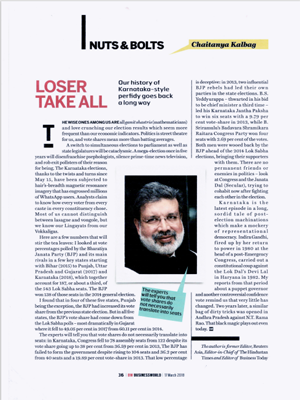LOSER TAKE ALL
[Business World]
Published date: 17 Mar 2018
The wise ones among us are all ganit shastris(Mathematicians) and love crunching our election result which seem more frequent than our economic indicators. Politics is street theatre for us, and vote shares mean more than batting averages.
A switch to simultaneous elections to parliament as well as state legislatures will be cataclysmic. A mega-election once in five years will disenfranchise psephologists, silence prime-time news television, and rob exit pollsters of their reason for being. The Karnataka elections, thanks to the twists and turns since May 15, have been subjected to hair’s-breadth magnetic resonance imagery that has engrossed millions of WhatsApp users. Analysts claim to know how every voter from every caste in every constituency chose. Most of us cannot distinguish between lasagne and vongole, but we know our Lingayats from our Vokkaligas.
Here are a few numbers that will stir the tea leaves: I looked at vote percentages polled by the Bharatiya Janata Party (BJP) and its main rivals in a few key states starting with Bihar (2015) to Punjab, Uttar Pradesh and Gujarat (2017) and Karnataka (2018), which together account for 187, or about a third, of the 543 Lok Sabha seats. The BJP won 138 of those seats in the 2014 general election. I found that in four of these five states, Punjab being the exception, the BJP had increased its vote share from the previous state election. But in all five states, the BJP’s vote share had come down from the Lok Sabha polls – most dramatically in Gujarat where it fell to 49.05 per cent in 2017from 60.11 per cent in 2014.
The experts will tell you that vote shares do not necessarily translate into seats: in Karnataka, Congress fell to 78 assembly seats from 122 despite its vote share going up to 38 per cent from 36.59 per cent in 2013, The BJP has failed to form the government despite rising to 104 seats and 36.2 per cent from 40 seats and a19.89 per cent vote-share in 2013. That low percentage is deceptive: in 2013, two influential BJP rebels had led their own parties in the state elections. B.S. Yeddyurappa – thwarted in his bid to be chief minister a third time – led his Karnataka Jantha Paksha to win six seats with a 9.79 percent vote-share in 2013, while B. Sriramulu’s Badavara Shramikara Raitara Congress Party won four seats with 2.69 per cent of the votes. Both men were wooed back by the BJP ahead of the 2014 Lok Sabha elections, bringing their supporters with them. There are no permanent friends or enemies in politics – look at Congress and the Janata Dal (Secular), trying to cohabit now after fighting each other in the election.
Karnataka is the latest episode in a long, sordid tale of post election machinations which make a mockery of representational democracy. Indira Gandhi, fired up by her return to power in 1980 at the head of a post-Emergency Congress, carried out a constitutional coup against the Lok Dal’s Devi Lal in Haryana in 1982. My reports from that period about a puppet governor
and another controversial confidence vote remind us that very little has changed. Two years later, a similar bag of dirty tricks was opened in Andhra Pradesh against N.T. Rama Rao. That black magic plays out even today.






